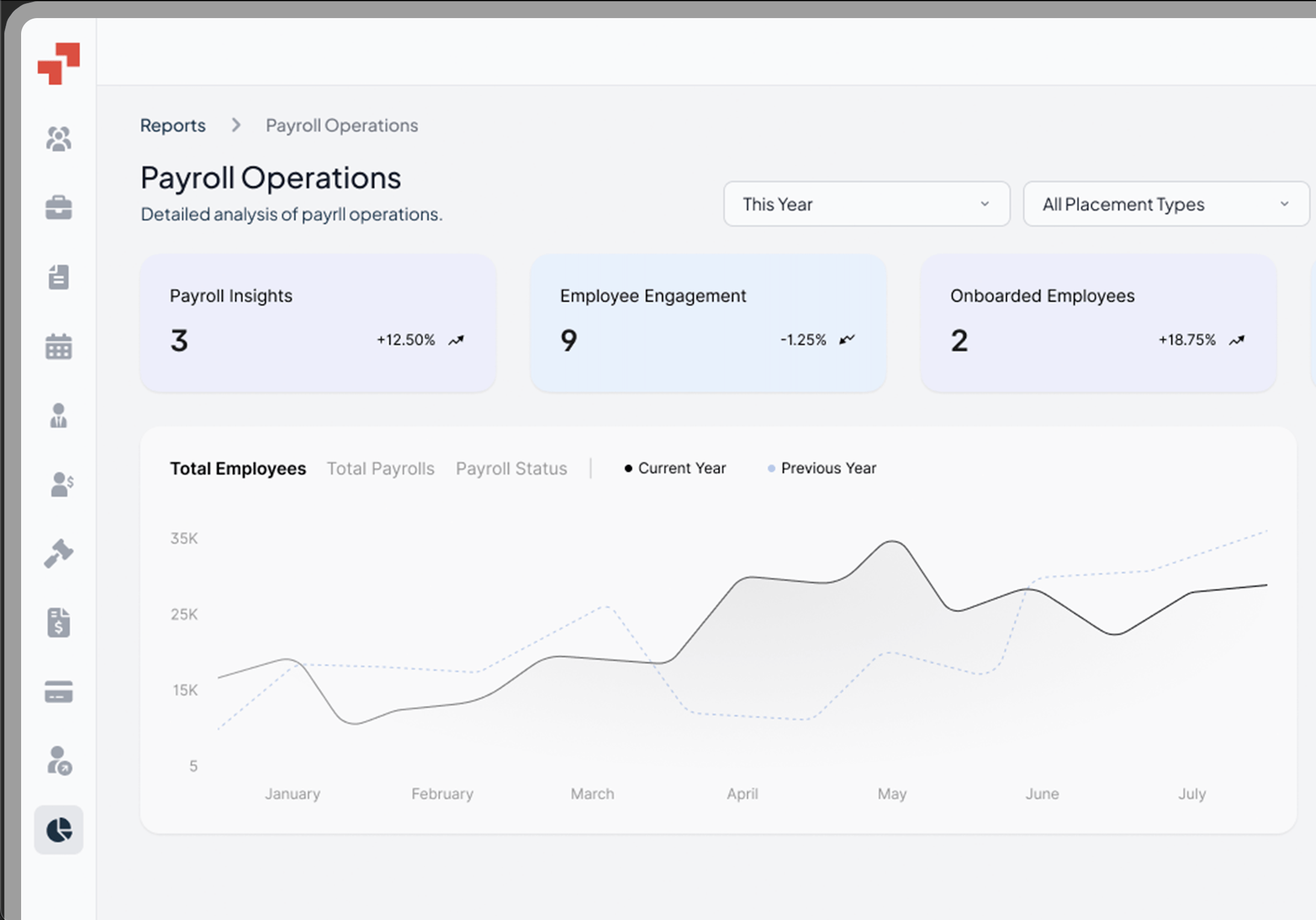Global Workforce GlossaryCompensation Analyst
Related Terms
Compensation and Benefits Manager
Global Compensation
Compensation Planning
Total Remuneration
Equity Compensation
In many organizations, a compensation analyst plays a key role in shaping fair and competitive pay structures. Their work often involves studying market data, evaluating internal equity, and supporting HR teams in making informed salary decisions. The role continues to evolve as companies adapt to new workforce trends and changing expectations around pay transparency.
Table of Contents
- What is co-employment?
- What are co-employment laws?
- Why is co-employment a risk?
- What are co-employment rules
- Co-employment do’s and don’ts
- How does co-employment work?
- What is the difference between co-employment and joint employment?
- Co-employment vs PEO
- Co-employment vs employee leasing
- Is co-op considered a full-time employee?
- Is it illegal to work for two jobs in the same industry?
- Co-employment examples
- Practical Case Study Example
- PamGro and Co-employment: Your Global Partner
What is a Compensation Analyst?
A compensation analyst is a human resources professional responsible for evaluating, designing, and maintaining an organization’s pay structure.
They ensure salaries, bonuses, and benefits are competitive, fair, and aligned with business goals.
These analysts research market trends, gather market intelligence, benchmark against industry standards, and provide insights to support pay raise decisions. Their work helps organizations attract and retain talent while staying compliant with labor laws. Regular audits are conducted to ensure pay equity and compliance with laws regarding pay differences based on protected characteristics.
Key responsibilities of compensation analysts include data analysis, regulatory compliance monitoring, and stakeholder communication. As part of the HR function, they often collaborate with recruiters, finance teams, and managers to maintain equitable and cost-effective compensation strategies. Additionally, they often advise on total rewards programs, including benefits, incentives, and recognition initiatives, which enhances overall employee satisfaction and retention.
What Does a Compensation Analyst Do?
A compensation analyst analyzes job descriptions, market data, and internal salary information to recommend appropriate pay ranges. They also review pay equity across departments and ensure compliance with regulations. A compensation analyst regularly reviews all employee compensation packages to ensure fairness. Compensation structures must adhere to applicable labor laws to avoid legal risks and ensure fair treatment.
In practice, their role involves conducting salary surveys, preparing compensation reports, and assisting managers with pay-related questions. They often work on special projects, like creating incentive programs or updating total rewards packages. Since they’re detail-oriented professionals, they evaluate the effectiveness of pay structures, identify gaps, and recommend adjustments to stay competitive in job postings and talent markets.
Budgeting is a critical responsibility of compensation analysts to ensure financial sustainability of the overall compensation plan. Compensation analysts need data and technology competencies to analyze compensation-related data. They may also monitor industry trends, economic shifts, and legal updates to provide timely recommendations that support organizational goals.
How to Become a Compensation Analyst
To become a compensation analyst, you typically need a bachelor’s degree in human resources, finance, economics, or business administration, along with specific skills required for the role. Courses in statistics, labor relations, and organizational psychology can also be helpful. More and more companies are dropping the degree requirement for compensation analysts, focusing on candidates’ skills and experience instead.
Gaining experience in HR, payroll, or financial analysis provides a strong foundation. Many analysts start in HR coordinator roles before moving into compensation. Direct experience in HR or finance through an internship or entry-level administrative role is usually required for compensation analysts.
Professional certifications, like Certified Compensation Professional (CCP), enhance credibility and career opportunities, providing additional knowledge in the field. Certification is not typically a requirement for compensation analyst roles, but it helps differentiate candidates. Strong analytical skills, attention to detail, and the ability to interpret market data are essential to succeed. Networking, mentorship, and internships in HR or compensation roles can also accelerate career progression.
What is a Compensation Analyst Salary Range?
The salary of a compensation analyst varies based on location, experience, and industry. In the U.S., the average annual salary typically ranges from $65,000 to $85,000, with senior analysts earning over $100,000. Entry-level roles may start closer to $55,000. The average annual base salary for a compensation analyst in the U.S. is approximately $65,972 according to Payscale and $72,758 according to Glassdoor.
Compensation analysts working in large corporations or specialized industries like tech and finance often earn higher salaries due to complex pay structures. Beyond base pay, analysts may receive performance bonuses, stock options, and comprehensive benefits, making total compensation highly competitive. Analysts with international experience or certifications like CCP often see accelerated salary growth and more leadership opportunities.
What are the Job Duties of a Compensation Analyst?
Compensation analyst duties include researching pay structures, conducting internal equity reviews, creating compensation models, and assisting with annual pay raise cycles. They also support HR in drafting job descriptions and analyzing how compensation impacts retention.
Additionally, they advise managers on pay practices, prepare compliance reports, and ensure alignment with company budgets. Since compensation is closely tied to employee motivation, their input plays a critical role in total rewards strategy.
Compensation philosophy guides pay decisions and reflects company values regarding compensation mix and market positioning. They may also participate in designing bonus and incentive programs, evaluating the effectiveness of new pay initiatives, and providing actionable insights for workforce planning.
What Types of Compensation Analyst Positions Exist?
Compensation analyst positions exist across industries, ranging from entry-level analyst roles to senior and managerial levels. Job postings often include titles such as Compensation Analyst I, II, or Senior Compensation Analyst.
At higher levels, responsibilities expand to managing compensation programs globally, designing executive pay structures, and overseeing compliance across multiple regions. These positions are typically part of the HR or Total Rewards team, with opportunities to progress into broader HR leadership roles. Analysts who gain experience in multiple regions or in multinational companies often move into strategic roles, influencing global compensation policies.
Compensation Analyst vs Financial Analyst: What’s the Difference
A compensation analyst focuses on employee pay structures, salary surveys, job analysis and benefits, while a financial analyst evaluates a company’s overall financial health, investments, and forecasts.
Although both roles require strong analytical skills, compensation analysts specialize in human resources strategy, while financial analysts focus on profitability and capital allocation. In practice, compensation analysts deal with job postings, pay raises, compliance, and total rewards programs, while financial analysts work with budgets, investments, and revenue projections.
Compensation Analyst vs Specialist: How this Roles Differ?
A compensation analyst typically reviews data and provides recommendations, while a compensation specialist may handle day-to-day tasks like administering pay programs, processing changes, and maintaining records.
In many organizations, the roles overlap. Analysts are often more data-driven and focused on long-term pay structures, while specialists provide direct operational support. Both are crucial in ensuring fair and competitive compensation programs. Analysts also often mentor specialists to ensure accuracy, efficiency, and adherence to HR policies.
What Is the Difference Between HR and Compensation Analyst?
HR professionals handle a wide range of employee-related functions, including recruitment, employee relations, and training. A compensation analyst, on the other hand, has a narrower focus on pay and rewards.
While HR managers may use a broad approach to support the workforce, compensation analysts provide specialized expertise in salary benchmarking, total rewards strategy, and regulatory compliance. Both roles work closely together to build effective employee engagement and retention strategies. Analysts may also advise HR leadership on the financial impact of pay adjustments and retention incentives.
Are Compensation Analysts in Demand?
Yes, compensation analysts are in high demand, especially as organizations compete for global talent. With businesses expanding globally, the need for experts who can design competitive pay structures and ensure compliance has grown significantly.
According to the U.S. Bureau of Labor Statistics, HR specialists (including compensation analysts) are projected to grow steadily over the next decade, particularly due to the increasing complexities of regulations. Companies increasingly view competitive compensation as a critical driver for attracting top talent, making analysts vital in today’s workforce.
The employment of compensation analysts is projected to grow by 10% by 2030 according to the U.S Bureau of Labor Statistics. According to the Bureau of Labor Statistics, the number of compensation analysts in the United States was 94,400 in 2019 and is expected to rise by 8% until 2029. Analysts who gain experience in global payroll, international labor laws, and total rewards are especially sought after by companies looking to improve their compensation strategies.
What Is Another Title for Compensation Analyst?
Another title for compensation analyst may include Compensation Specialist, Total Rewards Analyst, or Salary Analyst. In some organizations, the role may also be called Pay Analyst or Benefits & Compensation Analyst.
The exact title depends on company size and HR structure, but the responsibilities generally revolve around pay structure analysis, salary benchmarking, and compensation program support. Some roles may also focus on executive compensation, incentive programs, or equity plans, expanding the analyst’s strategic impact.
Can You Give an Example of a Compensation Analyst’s Work?
A growing tech company wants to hire software engineers in multiple countries. They hire a compensation analyst to benchmark salaries in each region, analyze local labor laws, and recommend pay ranges.
The analyst ensures job postings are competitive and equitable, total rewards packages are attractive, and annual pay raises are aligned with industry standards. They also track retention metrics, analyze pay equity across teams, and provide leadership with actionable insights to improve employee engagement. By providing data-backed recommendations, the company successfully attracts international talent, reduces turnover, and manages payroll costs efficiently, demonstrating how compensation analysts directly impact talent acquisition, business performance, and organizational growth.
How PamGro Helps
Global hiring often brings compensation challenges—different pay structures, compliance requirements, including state and federal regulations and cultural expectations. That’s where PamGro comes in.
As a global Employer of Record, PamGro enables businesses to hire internationally without setting up costly entities. We manage payroll, benefits, and compliance while helping you design competitive compensation packages in new markets. Whether you’re expanding to Europe, Asia, or beyond, PamGro ensures your pay structures are fair, legal, and attractive to top talent.
If you’re ready to expand globally with confidence, PamGro is your partner in simplifying compensation, compliance, and total rewards strategy.
Hire the Best Talent, Anywhere






